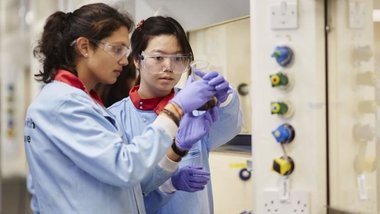24 March 2020
Our colleagues working in health and research always provide a vital service but are needed more than ever in the current fight against COVID-19.
King’s College London's community of nurses, midwives, academics, scientists, medics and researchers are focusing on supporting the country’s response to the pandemic and boosting NHS resources.
The nurse helping to train others and keep patients connected
Louise Rose is Professor of Critical Care Nursing in the Florence Nightingale Faculty of Nursing, Midwifery and Palliative Care and a qualified intensive care nurse. She is pausing her academic work at King’s College London to support intensive care staff at Guy’s and St Thomas’ NHS Foundation Trust, caring for patients and training junior Intensive Care Unit (ICU) nurses and others as they treat patients with COVID-19.
Louise is also working with Dr Joel Meyer, an ICU consultant at St Thomas’ Hospital and Michel Paquet, CEO of Aetonix, a Canadian company that have developed a secure online platform called Atouchaway. The platform enables secure communication between the ICU team and families, as well as virtual family visiting. This is especially helping those patients in critical care who haven’t seen their families since they were admitted to hospital. Testing will be at St Thomas’ Hospital and if successful, will be rolled out in UK and possibly Canada.
Louise Rose, Professor of Critical Care Nursing, said
The only way we are going to defeat this virus is by pooling all our resources together and sharing knowledge is a critical part of that. If my expertise can equip another nurse with the skills they need to care for someone in ICU then it is my responsibility to help them.
Collaborating with the University of Oxford to develop prototype for new ventilators
As more people are diagnosed with COVID-19, a virus which causes breathing and respiratory problems, the need for more ventilators is becoming ever more greater. To tackle this, an interdisciplinary team of engineers and medics from King’s College London and the University of Oxford are building and testing prototypes that can be manufactured using university and SME workshops. The team, led by Dr Federico Formenti, Professors Sebastian Ourselin, Andrew Farmery, Mark Thompson Alfonso Castrejon-Pita and Robert Staruch, have been working to meet the required specifications for safe and reliable function.
Dr Federico Formenti, senior lecturer, said:
Thinking beyond the current pandemic, we are also aiming to share the know-how and refinement of this relatively inexpensive approach with other countries.
Supporting the NHS on testing
King’s College London Infection and Immunity biomedical scientists are currently exploring ways that they can support the NHS and Public Health England (PHE). This includes developing a COVID-19 Diagnostic service capacity where a team can support on preparing samples from clinical swabs. They also plan to send staff to the Centre for Infections and Diagnostic Research to boost services there, working on novel diagnostic tests, point-of-care devices, as well as work on clinical samples from infected people. The team also in contact with PHE to see whether staff can also be deployed to work there.
Professor Stuart Neil, Head of Department, Infectious Diseases said:
Essentially the problem is this: NHS testing for COVID-19 is severely limited and will become more and more so as the epidemic progresses. As biomedical scientists, this is something we can do to help make a difference and these measures could offer a much needed lifeline to the already stretched NHS.
Volunteering
Given the scale of the national and global challenge of COVID-19, the NHS is facing unprecedented pressure on services. King’s College London has released all clinical academics from their current responsibilities should they wish to contribute to frontline care.
In an email to staff, Professor Ian Everall, Executive Dean Institute of Psychiatry, Psychology & Neuroscience (IoPPN) and Professor Richard Trembath, Executive Dean of the Faculty of Life Sciences and Medicine said:
As a medical community, we have a responsibility to do everything we can to bolster the NHS frontline response’.
Both Professor Everall and Professor Trembath have volunteered themselves. Psychiatrists, clinical psychologists and other staff from the IoPPN Academic Psychiatry Division and Psychology & Systems Sciences Division will be providing support to help with staffing and oversight of the service for South London and Maudsley NHS Foundation Trust.
In addition to staff support and research, IoPPN Senior Management are working to free up laboratory space for COVID-19 testing as well as providing an inventory of all the polymerase chain reaction (PCR) machines on site, to amplify NHS resources and increase the number of tests that can be carried out.
Professor Richard Trembath, Executive Dean of the Faculty of Life Sciences and Medicine said:
At this time we are all looking at ways to help NHS colleagues. As with so many of my clinical academic colleagues, I have expressed a desire to do whatever I can to support those delivering frontline services
To read the full story, visit the King’s College London website.





